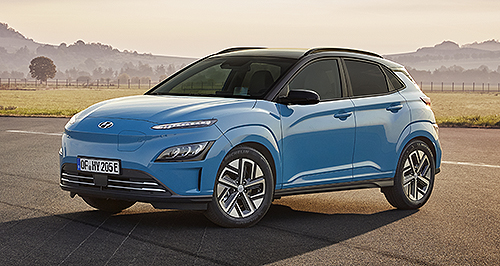Make / Model Search
News - General News - GovernmentIndustry welcomes PM’s 2050 carbon neutral ‘goal’Setting goals: Prime minister Scott Morrison says technology is the key to carbon neutrality, not taxes. Industry bodies react to government’s emission reduction, future fuel plans8 Feb 2021 AUSTRALIA could soon be headed towards carbon neutrality according to prime minister Scott Morrison who last week outlined his ‘goal’ of being carbon neutral by 2050, something that has been welcomed by the Federal Chamber of Automotive Industries (FCAI), the country’s peak industry body.
While stopping short of officially committing to the 2050 deadline, the Prime Minister made it clear Australia’s carbon neutrality would not be achieved through taxes, but rather the advancement of science and technology.
“In Australia, we will do this by investing and partnering in the technology breakthroughs needed to reduce and offset emissions in a way that enables our heavy industry in particular, industry more broadly, jobs and living standards, especially in regional Australia, to continue and to keep energy costs down,” he said.
“In Australia, my government will not tax our way to net zero emissions. I will not put that cost on Australians and I will particularly not ask regional Australians to carry that burden.
“Getting to net zero, whether here or anywhere else, should be about technology, not taxes and high prices.”
Reacting to the announcement, FCAI chief executive Tony Weber said the emphasis on science and technology to achieve these goals along with the very inclusion of a possible deadline were important signals that Australia was moving with the times.
“These signs of intent need to be matched by Federal and state governments working with key sectors to encourage the take-up of new technology and eliminating policy, regulatory and taxation settings that effectively limit appropriate purchasing decisions,” he said.
Mr Weber also mentioned the industry was already committed to, an on track to achieve, a 2030 carbon reduction target with the FCAI CO2 Emissions Standard.
For reference, under the FCAI CO2 Emissions Standard it is estimated that cars and light SUVs will, on average, have CO2 emissions under 100g per kilometre and heavy SUVs and light commercials under 145g per kilometre by 2030.
“Rather than prescribing one technology over another, we should continue to encourage buyers to make informed decisions and let the market – manufacturers and customers – drive the uptake of new and emerging technologies such as full electric and hydrogen as we move to 2030 and beyond to 2050,” Mr Weber said.
Following on from Mr Morrison’s announcement, minister for energy and emissions reduction Angus Taylor today released a discussion paper designed to help develop Australia’s Future Fuels Strategy.
Within the paper, it was revealed the Government will focus on three key principles to support the future fuels sector, those being the addressing of “barriers to the rollout of new vehicle technologies to increase consumer choice; investing in early-stage technologies to stimulate the market and drive private sector investment; and giving Australians access to the right information to help them make informed choices”.
One of the main considerations of the paper was the role traditional fuel, hybrid, hydrogen fuel cell, electric and bio-fuelled vehicles.
“We’re focusing on five priority initiatives where it makes the most impact to take action first, including commercial fleets, essential infrastructure and improving information to better inform motorists,” the minister said.
Those five initiatives consist of the expansion of electric vehicle (EV) and hydrogen refuelling infrastructures, an early focus on commercial fleets, better quality information being made available, integrating EVs into the electricity grid and supporting Australian innovation and manufacturing.
According to the Australian Automobile Association (AAA), the paper is headed in the right direction with a sensible principles-based approach being taken.
Managing director Michael Bradley went so far as to say that if managed properly, the adoption of new vehicle fuels and technologies would give Australians greater choice, cleaner air, improved fuel security and cheaper bills.
“The AAA supports the government’s priorities, that start with the need to enhance electric vehicle (EV) re- charging and hydrogen refuelling infrastructure, and to focus on the role commercial fleets can play in accelerating the uptake of cleaner fuel technologies,” he said.
“The government is right to immediately focus on addressing re-charging blackspots, which are a major cause of consumer apprehension, and which will likely persist in the short-term due to commercial realities.”
While in support of the paper’s position, Mr Bradley added that more needed to be done to look at a state and federal tax reform that could both incentivise the uptake of cleaner vehicles, while also capturing new technologies within Australia’s transport taxation system.
Mr Weber also voiced his support of the paper, citing the significance of the minister placing the focus on a mix of technologies rather than taxation.
“This research continues to present us with a vast range of options – from highly efficient internal combustion engines, through hybrids to battery or plug-in electric and hydrogen fuel cell,” he said.
“The Government is wise to acknowledge that the future directions include this range of technologies.”  Read more21st of August 2020  Townsville battery plant gets government approvalQueensland could be set to produce 250,000 EV lithium-ion batteries a year from 20247th of August 2020  ARENA backs new $2.9m EV smart charging trialAustralian Renewable Energy Agency contributes $838,000 to smart charging trial3rd of July 2020  AAA backs renewed calls for EV road taxProposed EV road tax gains support from AAA and NSW as fuel excise ages |
Click to shareGeneral News articlesResearch General News Motor industry news |











Facebook Twitter Instagram